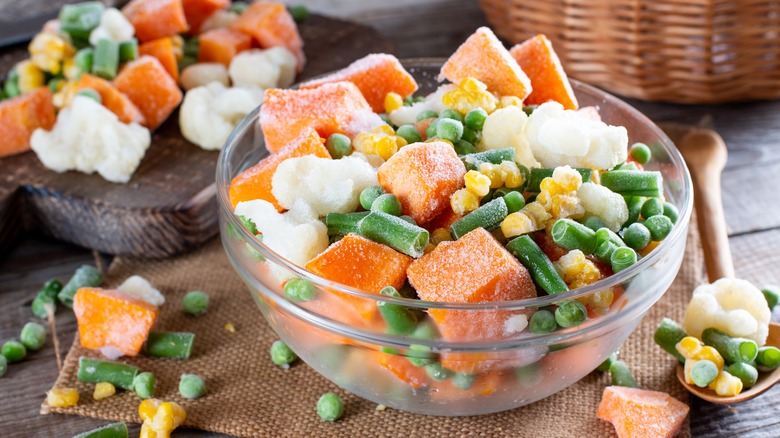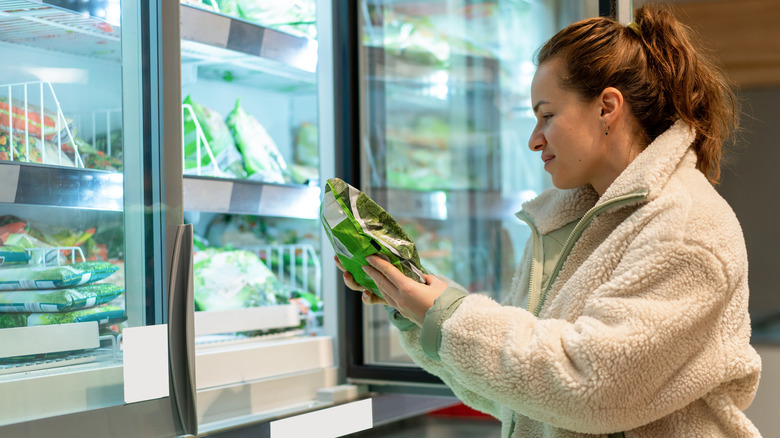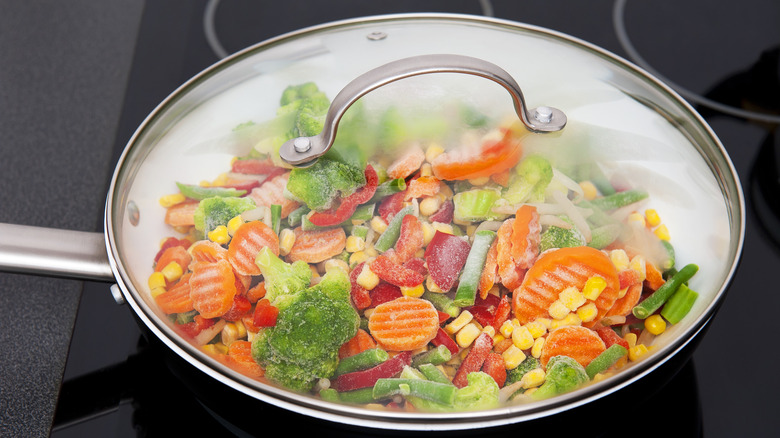Are Frozen Vegetables As Healthy As Fresh Produce?
Healthy eating on a budget can be tricky — and fresh vegetables aren't doing your grocery bill any favors. But luckily, thanks to research and insight from Consumer Reports, frozen vegetables may serve as a way to sidestep this expensive roadblock to a healthier diet.
Research from the University of California, Davis confirmed that freezing vegetables doesn't necessarily detract from their nutritional value. Culinary scientist Ali Bouzari, Ph.D. and his team tested blueberries, broccoli, carrots, corn, green beans, peas, spinach, and strawberries. Portions of the items were frozen and portions were subjected to typical industry conditions for fresh produce. After testing for nutritional value, they found that "good frozen produce is essentially a head-to-head toss-up with good fresh produce."
So any frozen vegetables from the store should, in theory, be just as healthy as fresh ones. But there's a catch. Not all frozen vegetables are sold flash-frozen like the ones in Bouzari's study. Some vegetables are seasoned, processed, or cooked before packaging — altering the vegetables' nutritional value and potentially damaging your diet.
What to look for when shopping for frozen vegetables
So how do you discern which vegetables are healthiest to throw in your cart?
Consumer Reports investigated popular frozen vegetable products, rating them for nutrition, flavor, and texture. After surveying everything from plain frozen Brussels sprouts to complicated quinoa blends, they determined a few key qualities to look for when selecting frozen vegetables.
First, you should check the sodium levels. Some pre-cooked options investigated by Consumer Reports, like certain brands of mashed cauliflower, contained shocking amounts of sodium. Despite the packaging that flaunted the mash's "reduced carbs" and other "healthy" attributes, a small serving contained nearly a fifth of the recommended daily limit of sodium.
Experts also recommend you double-check calorie claims — carb-filled foods like pasta and rice seem like they would be calorie-dense, but in reality a serving of either clocks in at well below 200 calories. A low-carb swap such as riced broccoli or beet noodles might be calorically comparable and less satisfying than just eating the real thing.
Lastly, Consumer Reports' data suggests that shoppers should look into added sugars in pre-prepared options. While some sugar is a relatively benign addition to a healthy diet, you probably aren't expecting to consume those sugars from your vegetables. A frozen vegetable and quinoa blend, for instance, might be coated with a syrupy sauce. These sugar amounts will be listed on the label.
How to add frozen vegetables to your meals
You don't need to buy a salty, sugary package of vegetables to prepare them in a way that tastes great. A little cooking and seasoning can make vegetables more enjoyable to eat. A person might be more likely to enjoy riced cauliflower, for instance, than large pieces of whole stalks. Mashed cauliflower might sound even more tempting and require even less cook time. Keating recommends adding a little bit of extra seasoning, cheese, or even lemon juice to frozen vegetables. She also advised that unseasoned frozen vegetables can easily stir into whatever meal you are already preparing — even a frozen mac and cheese can be upgraded by stirring in a few florets of broccoli.
The Centers for Disease Control and Prevention estimates that only about 1 in 10 Americans consumes his or her daily recommended allowance of vegetables — so seasoning and cooking can be an important perk.
However, some additives and methods of cooking the vegetables can make them less of a nutritious choice. It entirely depends on how they're prepared. "If something is seasoned with sauce, that's a trigger for you to turn over the package and look at the nutrition label," Consumer Reports dietitian Amy Keating told The Daily Meal.


